How to Sell Your Car Privately in 2026
If you want to sell your car for the highest possible price, selling privately could be a smart choice.
It’s important to know that while the potential rewards are greater, this method can be riskier than alternatives such as selling to a car buying service or dealership – and there’s no guarantee of a successful sale.
However, if you’re feeling anxious about making your first foray into private selling, we’ve got you covered. In this guide, we’ll cover the steps required to prepare your car for a high-value sale, advertise like a pro, and take payment safely.
We’ll also share some invaluable tips on selecting a secure private selling method and avoiding scams and legal pitfalls.
Quick links:
- Is it worth selling your car privately?
- How to sell your car privately (step-by-step)
- Legal considerations when selling your car
- Private selling methods: A comparative chart
- How to avoid scams and time-wasters
- General private selling tips
- Looking for a low-fuss alternative to a private sale? Sell your car to webuyanycar!
Get a free valuation
Is it worth selling your car privately?
Before selling your car privately, think about whether this aligns with your needs and priorities. Here are a few key factors to consider:
- Legality - Firstly, it's important to ensure that you are entitled to sell the car. For example, if your motor has outstanding finance, you can’t legally sell it. We’ll cover the legal considerations around private selling in detail later in this guide.
- Profit priority - If maximising profit sits at the top of your agenda, private selling is an avenue worth exploring. However, if you want a convenient, straightforward sale, you should consider alternative options.
- Age and condition - Consider the age and condition of your car. The potential profits on a newer, near-pristine car are likely to be higher than an older worn-out motor.
- Repair viability - You may be able to increase your car’s resale value by investing in a few well-placed fixes. However, it’s important to weigh any costs against the potential profit gain – and decide whether to repair the car or sell it in its current condition.
- Time and effort - You’ll need to set time aside to prepare your car for resale, advertise your motor, and meet with prospective buyers. If you can’t meet this time commitment, it could be difficult to sell your car on the private market.
- Personal preference - Decide whether you’re comfortable with managing the sales process. If this will be your first time selling privately, make sure you read the sections on secure selling and avoiding scams before getting started.
How to sell your car privately (step-by-step)
Selling your car privately can be a great way to get the best possible return, but it does take time, effort and some preparation. Unlike part-exchanging or going through a dealer, selling privately puts you in full control of the process, from setting the price to choosing who you sell to.
It also means you'll need to take responsibility for getting the car ready, advertising it properly, managing enquiries and ensuring all the legal and financial details are taken care of. With the right approach, the process can be straightforward and rewarding.
This step-by-step guide will walk you through everything you need to know to sell your car privately, from valuing your vehicle to completing the paperwork.
Step 1: Determine your car’s value
Before listing your car for sale on the private market, it’s important to find out what it’s worth. Simply guessing your car’s value won’t suffice. You might end up listing it for too much – or even significantly below its market value.
Knowing your motor’s value will enable you to set a realistic asking price - and help you determine what is (and isn’t) a reasonable offer.
You can find out your car’s value in under 30 seconds using our free car valuation tool. Here are a few tips for getting an accurate quote with our valuation tool:
- Enter your reg plate to get started.
- Provide as much detail about the car’s condition as you can.
- Report the vehicle’s history.
- State whether the car has previously been written off (as this can significantly affect its market value).

Step 2 – Preparing your car for resale
To prepare your car for resale:
-
Address any minor imperfections such as dents or scratches.
-
Deep clean the interior and exterior of the vehicle.
-
Take your car for a full valet if necessary.
-
If your last MOT was more than six months ago, book another one before selling your car. This will reassure prospective buyers that the car is in good working order.
-
Make sure you have the documents you need to sell your car such as your V5C logbook and service record book. If any key documents are missing, replace them to maximise your car’s resale value.
-
Replace any lost car keys. Having both sets should make it easier to sell your car.
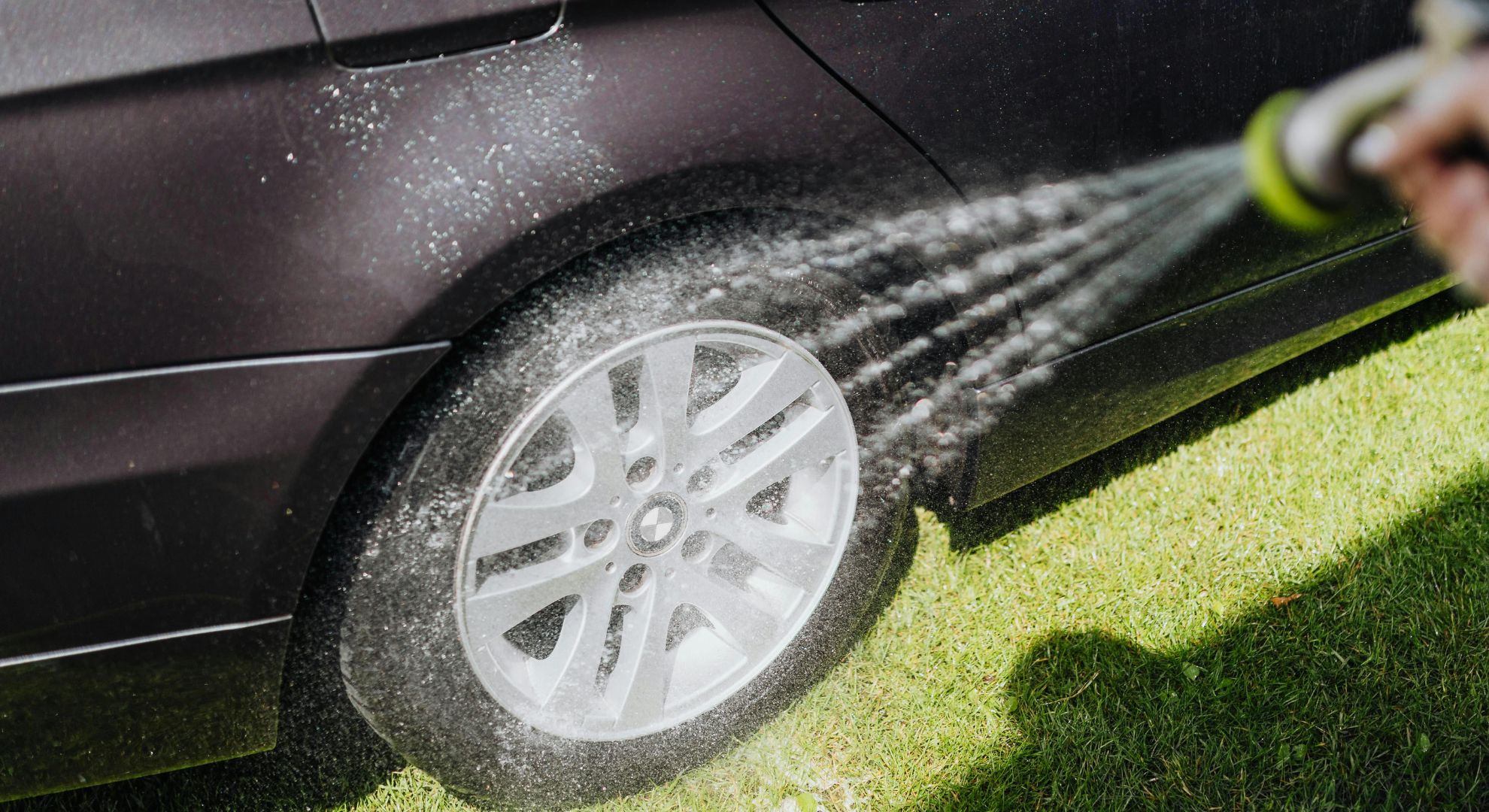
💡Get your car resale-ready: Clean, repair, and gather key documents for a smooth sale.
Step 3: Gather documentation
When selling your car, you should have the following documentation:
-
V5C logbook
-
Full service history
-
MOT certificates
-
Owner’s manual
-
Car warranty documents
-
Proof of purchase
Of all the documents highlighted above, the V5C logbook is the most important, as it plays a crucial role in the process of transferring car ownership.
Whilst you can technically sell your car without a V5C logbook, its value and saleability will be greatly reduced. Potential buyers may also be suspicious that the vehicle has been stolen. Therefore, we would recommend ordering a replacement logbook via the DVLA website – or by submitting a V62 form to the DVLA.
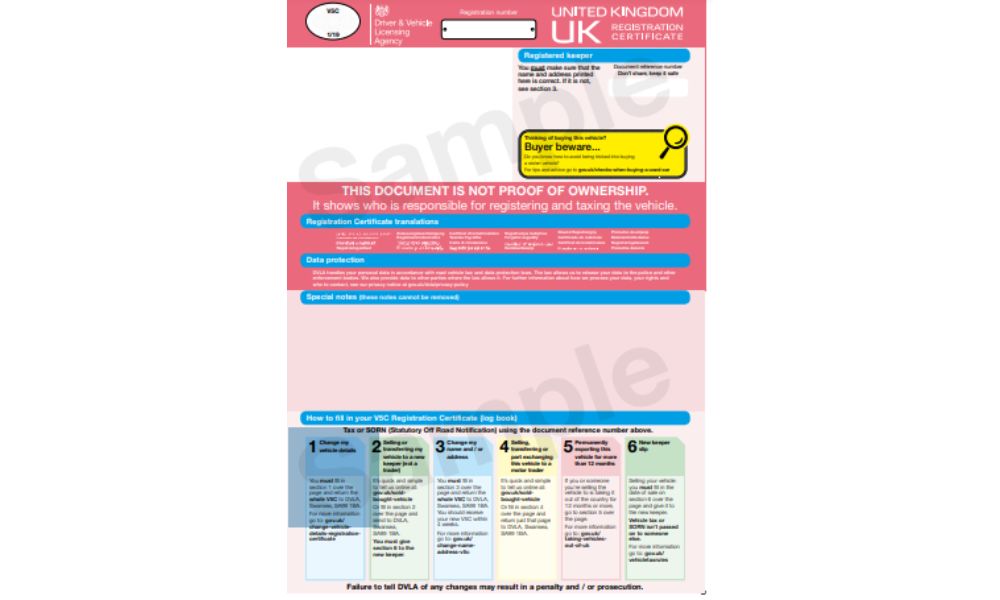
💡Your V5C logbook is essential for transferring car ownership—don’t sell without it!
Step 4: Advertise your car
Choosing the right platforms to advertise your car can make a big difference when it comes to attracting prospective buyers. You can utilise a variety of channels to showcase your car to a relevant audience:
Online car advertising
A quick online search will reveal a variety of car advertising websites such as:
- Auto Trader: This is a popular online marketplace for car buyers and sellers. You’ll usually have to pay to list your car here.
- Gumtree: If you’re selling just one car privately, you can list it on Gumtree free of charge. This online car marketplace connects local buyers and sellers.
- eBay Motors: This is a trusted online car auction website that charges fees for listing cars, and a final value fee at the point of sale.
- Facebook Marketplace: If you’re looking to sell your car locally, Facebook Marketplace allows you to list your car for free. You can choose to advertise to your friend list – or up to 20 Facebook groups. This platform tends to be geared towards the lower value end of the market.
Traditional offline advertising
Traditional offline car advertising avenues, such as print newspapers and magazines, noticeboards in shops and community buildings, and ads placed directly on cars for sale can also be very effective.
How to create an effective car ad
The golden rule when creating a car ad is to be as transparent as possible. Aim to provide readers with enough information to decide whether they want to arrange a viewing by including details such as:
- The car’s mileage, engine size, fuel type, and service history.
- Its current MOT status – and the date when the last MOT was carried out.
- The asking price and your contact information.
- The car’s trim level, optional extras, and details of any equipment upgrades.
- A series of good quality photographs taken in daylight clearly showing the interior, exterior, and any damaged areas.
- Remember to declare any damage, faults, and whether the car has been written off. This will help to prevent buyers from wasting your time and vice versa.
- If your car has been written off, you should also disclose its salvage title (i.e. Category A, B, S, or N).
- Being as transparent as possible about your car’s condition also minimises the risk of legal disputes.
Here are a few more useful tips:
- Avoid phrases that could paint you as a difficult seller, such as ‘serious offers only’ and ‘no hagglers’.
- Getting a quote with our free car valuation tool can help you to set your price realistically.
- Make sure your ad’s title is as informative as possible. Generic, attention-seeking headlines are only likely to get lost among the competition. When seen by a relevant reader, a clear, descriptive title such as ‘BMW 118i (blue) for sale’ is more likely to get a second look.
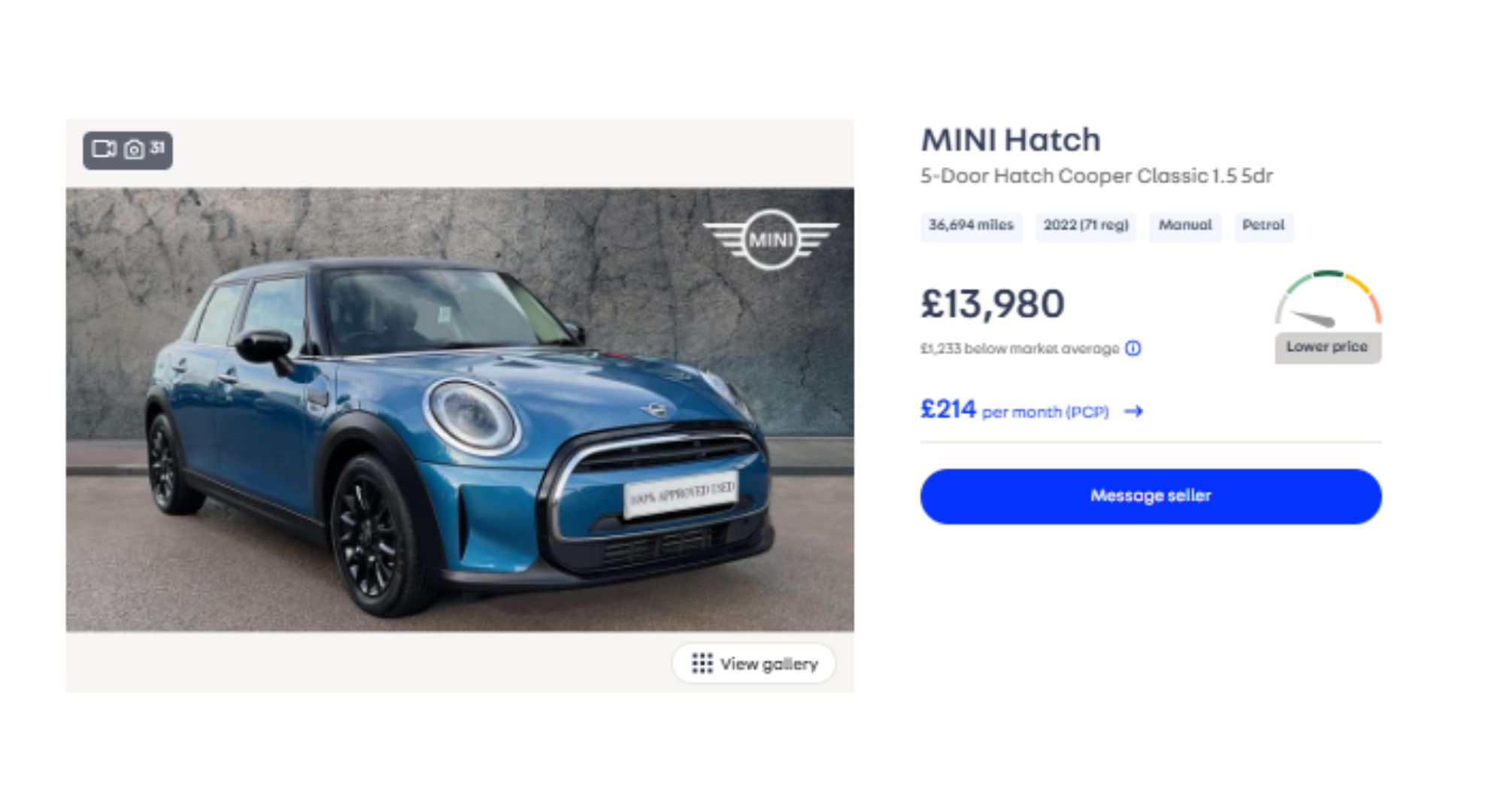
💡Choose the right platform to sell your car and create a clear, honest ad."
Step 5: Communicate with potential buyers
Once your car ad has started to gain traction, you should hopefully start receiving enquiries. Here are a few tips for clear and effective communication with prospective buyers:
- Note down your car’s key details, along with a list of potential objections and prepared responses. Refer to this information when fielding enquiries.
- If you lack confidence on the phone, ask a friend or family member to act out a few practice scenarios beforehand to ensure you’re well prepared.
- Aim to respond to all enquiries promptly.
- Take note of each prospective buyers’ details (including their preferred communication channel) and keep them informed at each stage.
- Don’t rely on your memory; schedule each meeting in your calendar to avoid missing appointments.
- Try to avoid cancelling viewings. If you really need to cancel an appointment, give the viewer plenty of notice and reschedule for a mutually convenient time.
- Maintain a respectful, professional tone in all your communications.
Step 6: Arrange viewings and test drives
Most potential buyers will want to inspect and test drive your vehicle before making a decision. This is a perfectly reasonable request. However, you should still exercise caution to ensure you can facilitate viewings and test drives safely and legally:
Safety precautions
- Ask the buyer to meet you somewhere familiar. Never meet at your home address.
- Asking a friend or family member to accompany you can help ensure each viewing/test drive runs smoothly.
- Always supervise potential buyers on a test drive to avoid becoming a victim of car theft.
Test drive considerations
- Before letting a buyer test drive your car, make sure they have a valid UK driving licence and are covered to drive the vehicle by their insurance.
- If they don’t have a valid driving licence and insurance, offer to demonstrate the car on their behalf.
- Include a variety of road types on your test route (e.g. country roads, built up areas, and motorways) so that any test drivers can get a feel for how the car handles in various conditions.
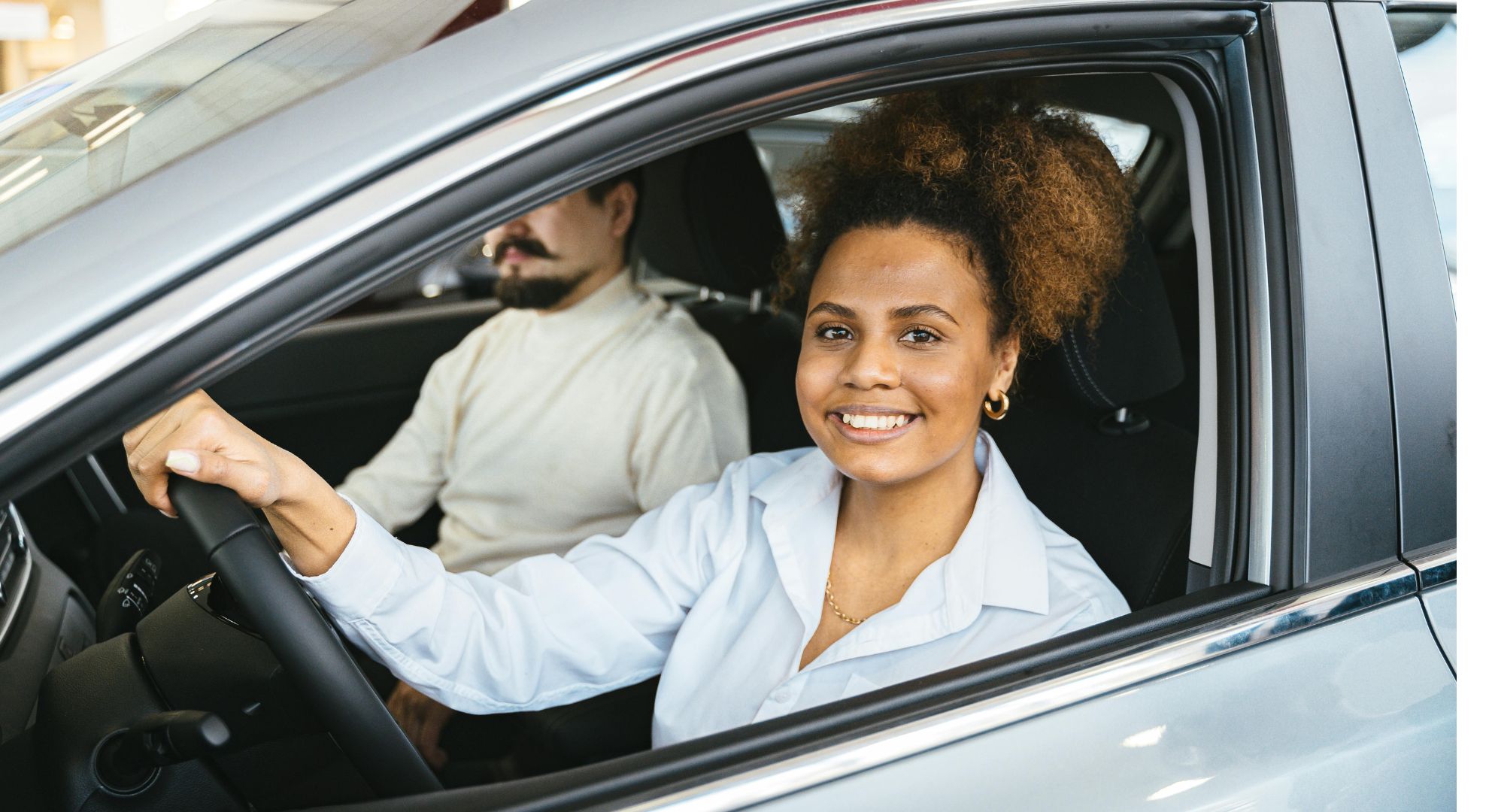
💡Ensure a safe and smooth test drive—meet in a public place, verify documents, and stay alert.
Step 7: Negotiate effectively
- Always set a reasonable initial asking price. Use our free car valuation tool to determine your motor’s value.
- Decide on the lowest amount you’re prepared to accept and stick to this figure. When haggling, never reveal your lowest price to the buyer.
- Make sure the description and photos included in any ads accurately reflect your vehicle. If they don’t, prospective buyers may walk away or expect you to drastically drop the price.
- Create a sense of urgency by informing the buyer that you have viewings booked with other sellers.
- It’s fine to drop the price if the buyer identifies legitimate issues, but if it feels like they’re trying to trick you to get a cheaper deal, back out of the sale.

Step 8: Take payment safely
When selling your car, we recommend sticking with one of the secure payment methods listed below. We’ll cover other less secure methods that are best avoided when selling privately later in this guide.
What are the most secure payment methods?
-
Bank transfer - This is a safe and secure payment method that’s widely accepted by car sellers.
-
CHAPS - A CHAPS payment is a type of same-day bank transfer that’s often used for high value transactions. They often come with a fee of around £25 to £35 and buyers can make payment by phone, post, or at their bank.
-
Escrow - An escrow is a secure financial arrangement where a third party holds funds until both buyer and seller fulfill all sale conditions.
Proceed with care
- Cash - Always exercise caution when accepting cash. This payment method is easy for fraudsters to exploit by using counterfeit notes, or due to the lack of a paper trail. If you’re accepting payment by cash, arrange to meet the buyer at the bank and ask the teller to count and verify the notes.
- Cheque - We’d advise against accepting a cheque as payment for your car. You may be given a void cheque, or the buyer may write a cheque from an account with insufficient funds, causing it to bounce. If you must accept a cheque, make sure it has cleared before completing the sale.

Step 9 – Final steps
Once you’re satisfied that the buyer has paid for the vehicle in full, there are just a few loose ends to tie up, including notifying the DVLA that you’ve sold your car:
- Make sure you have issued a private car sale receipt to the buyer. There are many free receipt templates available online that you can download and print.
- Ideally, this should be printed and signed by both you and the buyer before they take the car, but this can be done afterwards if necessary.
- It is your obligation to tell the DVLA when you’ve sold, transferred or bought a vehicle. You can transfer ownership of your vehicle online via the gov.uk website.
- Once you have cancelled your car tax, you will automatically receive a car tax refund for any full months’ outstanding cover by cheque or Direct Debit (depending on your payment preferences).
Legal considerations when selling your car
- Make sure that you have the right to sell the car. It is illegal to sell a car if you are not the legal owner – or don’t have proof of permission to sell it on their behalf.
- You must represent the car accurately verbally and in writing. Although there is no legal requirement to assure buyers about your car’s condition, you cannot be misleading. You must answer any questions about the vehicle honestly.
- It is an offence to knowingly sell a car that is unroadworthy, unless the buyer is made fully aware of its condition.
- Print out two copies of a seller’s contract. Complete yours in front of the buyer, then give the other copy to the buyer to sign and keep as proof of the sale.
- A seller’s contract can help you avoid receiving an incomplete payment, if you include an obligation for the buyer to pay the full amount (within a specific timeframe) before they can take ownership of the vehicle.
Transferring ownership
It is your responsibility to transfer car ownership to the buyer at the point of sale. This involves notifying the DVLA of the change of ownership. If you fail to do so, you could be held liable for any motoring offences committed by the new owner – and face a fine of up to £1,000 from the DVLA.
Selling a car with outstanding finance
If your car is subject to a finance agreement, you’ll need to settle any outstanding finance before listing your car for sale.
It’s illegal to sell a financed car without notifying your lender and settling the balance.
Test drives
Viewers must have a valid UK driving licence and insurance to test drive your car. If they don’t, you can offer to test drive the car on their behalf.
Private plates
If you have a private reg plate and are happy to sell it with the car, no action is required.
However, if you wish to retain the private plate, you’ll need to take it off the car using the DVLA’s service before selling it. Otherwise, the right to use the plate will be transferred to the new owner at the point of sale.
After the private plate has been taken off the vehicle, its original reg number will be restored. You should then reattach the original plates or obtain replacements.
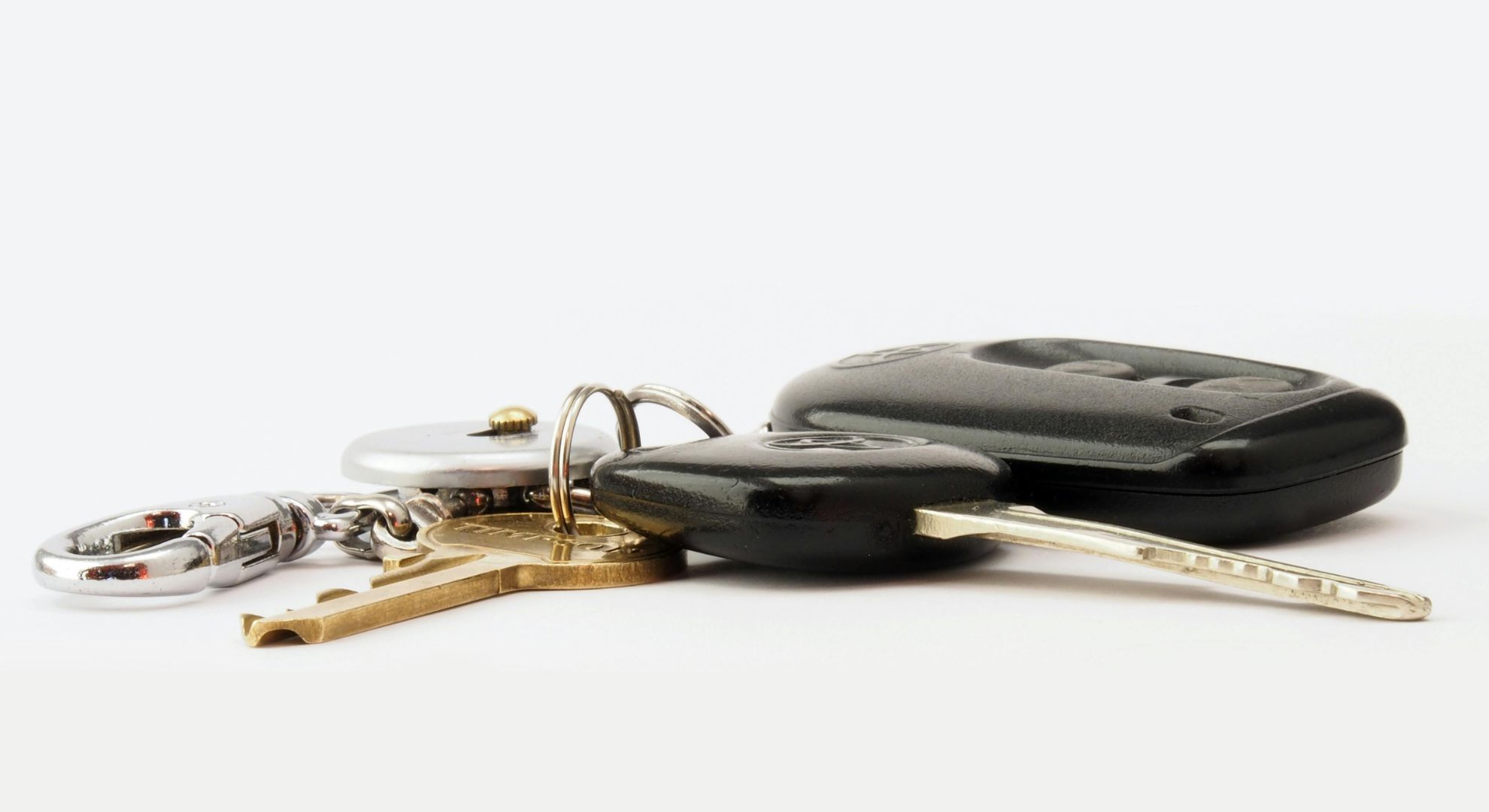
💡Know your legal responsibilities—transfer ownership, settle finance, and ensure a secure sale.
Private selling methods: A comparative chart
| Selling to a friend/family member | Autotrader | Facebook marketplace | Auction | Car enthusiast forums | |
|---|---|---|---|---|---|
| Difficulty | 🟢Selling to someone you trust should be straightforward. | 🟢 Setting up an ad is generally intuitive. | 🟢 You just need a Facebook account. | 🟡 Requires knowledge of the auction process. | 🟢 Sign up for an account with your email address, post an ad and you’re all set! |
| Cost | Free | £18.95-£45.95 * depending on your choice of advertising package. | Free | Entry fees, storage costs, and commission (5-10%) may apply. | Usually free of charge. |
| Security | ⭐⭐⭐You’re selling to someone you know and trust. | ⭐⭐The site is secure and trustworthy, but you are responsible for screening viewers and buyers. | ⭐⭐Generally secure but you need to be vigilant for phishing scammers. | ⭐⭐⭐It’s safe to sell with a reputable auction company. | ⭐⭐Usually secure but caution is advised. Established users are often more trustworthy. |
| Profit | 🟡You might not get the highest possible price, as there is no competition. The trusted buyer may request a favourable price. | 🟢Good profit potential for high-value cars, thanks to the large potential audience. Small potential profit for less valuable and collectable cars. | 🟡Less suitable for profit focused sellers. Facebook marketplace is weighted towards lower value cars. | 🟢Good profit potential with rare, classic, and collectable cars in good condition. | 🟢Good profit potential for niche and classic cars. Classic car forums are worth exploring to find the right buyer for a niche car. |
| Pros | ✅Safe and secure, lower risk of scams. | ✅Provides a secure selling platform and a large pool of potential buyers. | ✅Allows you to advertise to your friend list or up to 20 community groups. | ✅Can be a great option for selling rare, classic, and collectable cars. | ✅Enthusiasts may offer a great price if you have a car they love. |
| Cons | ❌Potential profits may be limited. | ❌Fees for advertising apply and may significantly reduce profits for lower value cars. | ❌Greater risk of scammers and less profitable than some other selling channels. | ❌Entry fees, commission, and storage costs will reduce profit. | ❌Forum members may not be locally based, so arranging the sale may present logistical challenges. |
*Pricing correct as of 22nd January 2025.
How to avoid scams and time-wasters
In this section, we’ll highlight some of the most prevalent tactics used by unscrupulous buyers to help you avoid car selling scams:
Telltale scam behaviour
You should abandon the sale if you notice any of the following signs:
-
Unrealistic offers: A scammer may attempt to lure you in by making an unrealistic offer that’s significantly higher than your car’s actual value. If it sounds too good to be true, it probably is!
-
Asking to buy before viewing: Most genuine buyers won’t buy a car before they’ve seen it for themselves.
-
Overeagerness: A buyer using a stolen credit card will usually have a very short window to make purchases before the owner cancels it. So, they’ll pressure you into completing the sale quickly – and may use a cover story such as a family emergency to create plausibility. Don’t fall for it.
-
Changing communication methods: If a buyer pressures you to abandon your chosen selling platform and continue correspondence by text or email, you could be dealing with a scammer.
Test drive scams
When meeting viewers and supervising test drives, ask a friend or family member to accompany you. Having an extra pair of eyes can help you stay safe and avoid scams.
Here are a few scam tactics to look out for:
-
The ‘dirty oil trick’: A viewer will distract you while their accomplice pours oil into the coolant reservoir. This will cause smoke to pour from the engine during the test drive, then the tester will demand a generous discount. Unfortunately, this underhand trick can cause costly damage to your car, so be vigilant!
-
Asking to meet in a secluded spot: Don't meet viewers at unfamiliar locations. Scammers have been known to lure sellers to remote places then take their car by force.
-
Stealing your unattended car: You should never leave the keys in the ignition or allow anyone to test drive your car without supervision. A determined scammer will jump at the chance to drive off while you’re distracted.
Avoid unsafe payment methods
Receiving payment via these methods presents an increased risk of fraud:
-
PayPal - You should not accept payment for a car via PayPal as the platform does not offer seller protection.
Therefore, an unscrupulous buyer could easily dispute the payment and potentially receive a full refund, even after you have transferred ownership, depriving you of your car and your money.
-
Cryptocurrency - In the UK, cryptocurrencies are not widely regulated, meaning sellers have little legal protection if there is an issue with a payment.
Scammers may use fake wallets or invalid transactions to falsely claim they have paid, leaving the seller with no recourse.
-
Digital wallet apps - Cash App (and similar digital wallet apps) provide a convenient way to receive money from people you know and trust.
However, we advise against using these apps to accept payment from a stranger, as they don’t offer the same level of seller protection as many other methods.
Some scammers may pay for a car with their digital wallet, then dispute the transaction with their bank. This could cause you to lose the proceeds of the sale, even if you have already transferred ownership.
-
Don’t take payment in instalments - Never accept a deposit as payment or agree to take payment in instalments. There’s nothing stopping the buyer from disappearing with your car after paying the initial deposit!

💡Watch for scam tactics, verify buyers, and use secure payment methods.
General private selling tips
-
Selling privately can take longer than other methods. So, don’t be disheartened if it takes you a couple of weeks or even months to sell your vehicle.
-
Transparency is important throughout the selling process. Be honest with potential buyers about the quality and appearance of your vehicle, just as you would expect them to be honest with you.
-
Screen record messages and phone calls and if you suspect you’re dealing with a scammer, abandon the sale.
-
Always be on your guard and watch out for potential scammers when dealing with online enquiries. If it seems too good to be true, it probably is.
-
If possible, accept a secure payment method such as an escrow service or a BACS or CHAPS transfer – and avoid any methods with less seller protection such as PayPal or digital wallets.
Looking for a low-fuss alternative to a private sale? Sell your car to webuyanycar!
If you’ve decided that selling your motor privately is more hassle than it’s worth, there’s a simpler solution.
You can sell your car quickly and conveniently with webuyanycar. There’s no need to spend your time meeting car dealers and punters – and you can rest easy, safe in the knowledge that you’ve got a guaranteed sale.
Here’s how it works:
-
Enter your reg number into our free car valuation tool.
-
Book an appointment at any of our 550+ UK branches.
-
Drive to your appointment.
Happy to sell? Happy days. We’ll help out with the paperwork and send the money to your bank.
Quick links:
- Is it worth selling your car privately?
- How to sell your car privately (step-by-step)
- Legal considerations when selling your car
- Private selling methods: A comparative chart
- How to avoid scams and time-wasters
- General private selling tips
- Looking for a low-fuss alternative to a private sale? Sell your car to webuyanycar!







